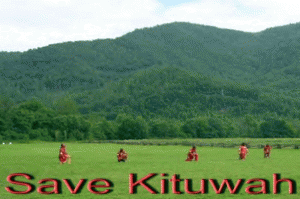Cherokee Native Americans in North Carolina are currently fighting the construction of an electrical station they say would impede the spiritual experience at Kituwah, a sacred mound that is cherished as the place where God gave the Cherokee their laws and their first fire. It is believed to have survived nearly ten thousand years.
The mound is 170 feet in diameter and five feet high.
Although indigenous remains – both human and cultural – are protected in the United States by the 1990 Native American Graves Protection and Repatriation Act, sacred earthworks called mounds are still vandalized in the eyes of many Native Americans.
The Cherokee fight to keep the mound untouched is on Facebook with more than 2,000 “SAVE KITUWAH” fans.

Photo of Kituwah posted in Facebook group by Red Gryphon
Assistant attorney general of the Cherokee reservation, Hannah Smith, sent an email to Duke Energy. It is posted on Facing South, the website of the Institute for Southern Studies. She describes the effort to guard the area that the Eastern Band of the Cherokees repurchased in 1996:
While I understand the need for power and know that change is by-product of progress, I explained my desire to have Duke Power mitigate as much as possible the visual impact this tower structure is going to have on the experience Cherokee people have when they visit Kituwah. I used a metaphor to describe the impact on this ancient view shed of Kituwah in hopes that it might convey a better understanding of how I (and most Cherokees) are going to be affected. I said that erecting this unattractive industrial looking “eye sore” so close in proximity to our ancient and sacred Mothertown was like putting up a power substation next door to a great Cathedral (like St. Peter's Basilica in Rome). The Cherokee culture values the Kituwah site and what is left of its unspoiled beauty like most of the world values St. Peter's for its iconic beauty and ancient place of worship.
If the Cherokees persuade Duke Energy to halt construction, it would be their second victory this year. In January 2010, according to Save the Sacred Sites blog, the Department of Defense stopped construction of an airport on Iolta – an ancient Cherokee village and burial site in North Carolina – until further investigation. But other Native American sites, as summarized by Facing South, were not as lucky:
Last year a mound near Oxford, Ala. was used as fill dirt for the construction of a Sam's Club, and another Indian mound in the Oxford area was recently found to have disappeared during construction of a municipal sports complex.
In the late 1990s, an Indian burial site in Nashville, Tenn. was demolished to build a Wal-Mart Supercenter, while another Indian burial site along the Cumberland River in that city was disturbed during construction of a stadium for the Tennessee Titans National Football League team. And Georgia is building a four-lane highway near the Ocmulgee National Monument, a site of great significance to the Muscogee (Creek) people.







8 comments
An outrage and heartbreak for Indians, a terrible loss to all people when one of these ancient structures is ruined.
I will send out messages to all that I know, to send out the word. This continued blatant disrespect for sacred sites of the Indian people is an outrage that cannot go on any longer.
The laws once again need to change from what was put in place in 1991 and the right out disrespect to our sites needs to be stopped and protected. We do not want to become a part of the melting pot that is existing today. Continue voicing your concern over all native sites as this week Kituwah is in tribal, city and Duke Energy talks. Why must we as native people continue this battle with others. How sad this day is.
Melting Pot… That’s a pretty good description isn’t it? Cultures are melted, broken down into a thick, indiscernible liquid and then forced into a mold. Until all appear the same on the surface. Forced to hide the substance of which each is made.
This sort of desecration has been going on for centuries. When will the human race rise above it’s ignorance and learn to act with respect?